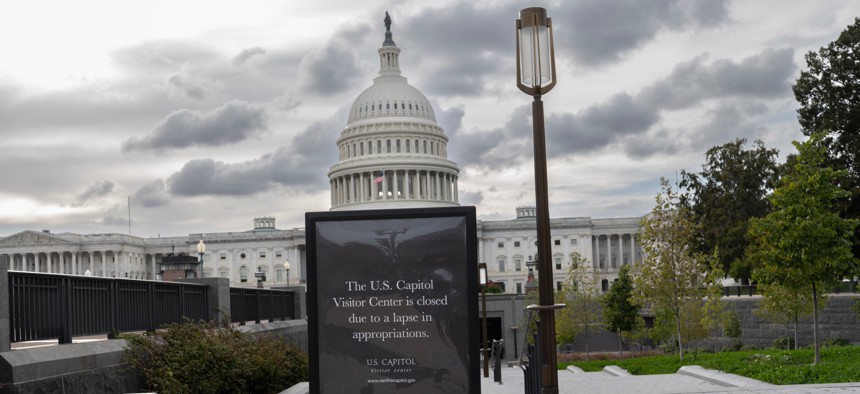
Federal employee unions and associations are calling for an end to the government shutdown, though with different perspectives on the stopgap legislation needed to do it. Probal Rashid / LightRocket / Getty Images
Federal employee groups want to reopen government. They disagree on how
While the nation’s largest federal employee union called for Congress to enact House Republicans’ short-term funding deal, another association for federal workers and retirees warned it isn’t as “clean” as proponents say.
As most federal employees brace for a fifth-straight week of being furloughed or forced to work without pay, unions and associations that represent them are putting increasing pressure on lawmakers to return to the negotiating table to cut a deal to reopen the government.
The American Federation of Government Employees led the renewed push on Monday, calling on Congress to immediately vote to reopen the government, ensure all federal workers receive back pay, and then continue to debate issues like the looming Affordable Care Act premium hikes that set off this month’s political standoff. In a letter to senators, AFGE National President Everett Kelley urged lawmakers to begin floor debate on the House-passed continuing resolution, which would fund federal agencies until mid-November.
“As president of the largest federal employee union, I cannot countenance the sight of workers I represent standing in food lines," he wrote. "It should trouble the conscience of every member of Congress and indeed every American. Whether they are declared excepted workers or are furloughed—a designation they do not choose—federal workers are for the most part not being paid. Yet their obligations remain to pay mortgages and monthly rents, credit card bills and childcare, and gasoline and automobile loans.”
But other groups said that despite the pain many feds feel, the House GOP plan to fund the government remains insufficient, particularly in light of the Trump administration’s on-again, off-again insistence that a law that explicitly requires the issuance of back pay to all federal workers at the end of appropriations lapses does not require it.
William Shackelford, national president of the National Active and Retired Federal Employees Association, wrote in his own letter to lawmakers Tuesday that the so-called “clean CR” passed by the House is a misnomer, in light of House Republicans’ refusal to allow Democratic input into the bill’s contents and the White House’s efforts both before and during the shutdown to impound or otherwise redirect funding, contrary to appropriations law and the 1974 Impoundment Control Act.
“We do not view the House-passed CR as clean, as that term has previously been used to indicate a continuation of a previously negotiated, bipartisan status quo,” Shackelford wrote. “That is not the case now. The Trump administration’s unilateral impoundment and rescission (in some cases approved by Congress on a partisan basis, in others not at all) of appropriations agreed to on a bipartisan basis has nullified the existence of any bipartisan status quo regarding annual funding . . . Bipartisanship is crucial, not because the views of one party or the other must be approved, but because Senate rules require 60 votes, and therefore bipartisan support, for appropriations bills.”
From NARFE’s perspective, Democrats should scale back their demands for the extension of ACA subsidies as a condition for reopening the government. And House Speaker Mike Johnson needs to call his chamber back to Capitol Hill, Shackelford argued.
“We urge Democrats to moderate public (and private) demands related to issues outside the normal scope of appropriations to foster talks to end the shutdown,” he wrote. “However, we recognize such an approach cannot end the shutdown without further good faith negotiations on government funding to ensure any deal is a deal. This would require, at minimum, Speaker [Mike] Johnson to bring the full House of Representatives back to Washington, D.C., to work across the aisle to find common ground.”
Share your news tips with us: Erich Wagner: ewagner@govexec.com; Signal: ewagner.47
NEXT STORY: Shutdown layoffs indefinitely blocked following new court injunction







